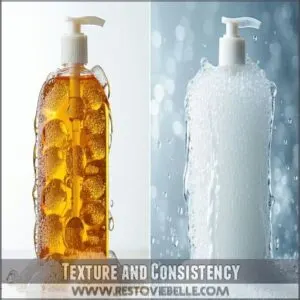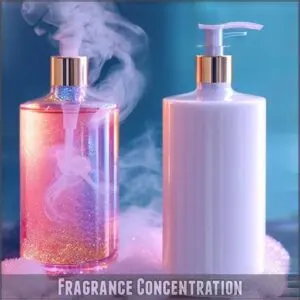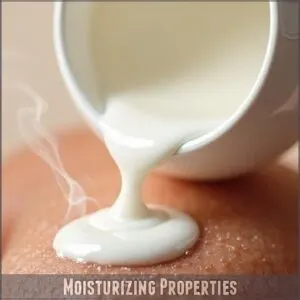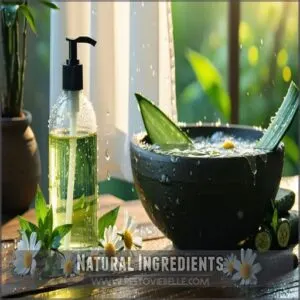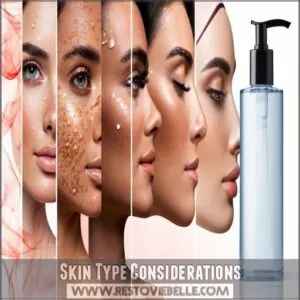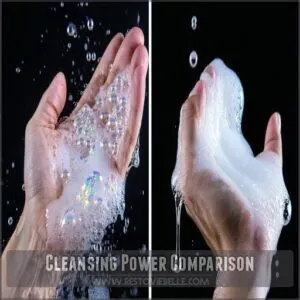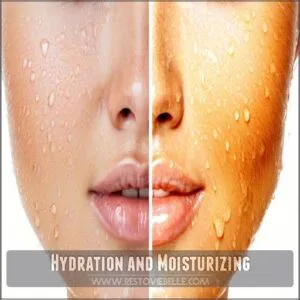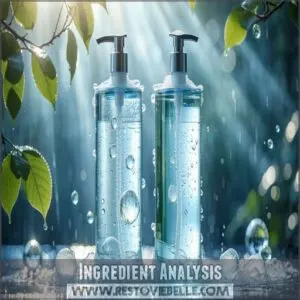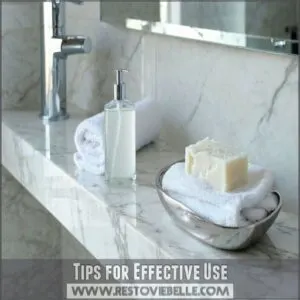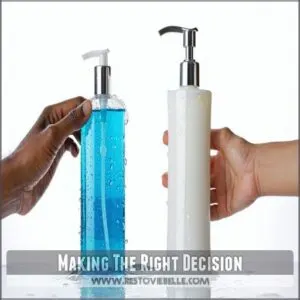This site is supported by our readers. We may earn a commission, at no cost to you, if you purchase through links.
 Ever wondered about the shower gel vs body wash debate? Here’s the scoop: shower gels pack a punch with their thick texture and higher fragrance concentration, making them perfect for deep cleansing and tackling oily skin.
Ever wondered about the shower gel vs body wash debate? Here’s the scoop: shower gels pack a punch with their thick texture and higher fragrance concentration, making them perfect for deep cleansing and tackling oily skin.
They’re like a power wash for your body! Body washes, on the other hand, are the gentle giants of cleansing – they’re creamier and more hydrating, ideal for dry or sensitive skin.
While both create great lather, your skin type holds the key to choosing between them. Understanding the science behind these cleansers reveals surprising benefits that could revolutionize your shower routine.
Table Of Contents
- Key Takeaways
- Shower Gel Basics
- Body Wash Essentials
- Skin Type Considerations
- Cleansing Power Comparison
- Hydration and Moisturizing
- Ingredient Analysis
- Shower Gel Vs Body Wash
- Choosing The Right Cleanser
- Tips for Effective Use
- Making The Right Decision
- Frequently Asked Questions (FAQs)
- What’s the difference between a body wash and a shower gel?
- Is it safe to shower with a rash?
- How do you know if a shower gel or body wash is hygienic?
- How do you use a body wash & shower gel?
- Should you use a shower gel or a wash?
- Is shower gel or body wash better?
- Can I use shower gel to wash my body?
- What is the purpose of shower gel?
- Is it better to shower with soap or gel?
- What is the difference between shower gel and bar soap?
- Conclusion
Key Takeaways
- You’ll get better results with shower gel if you have oily skin since it contains stronger clarifying agents and deep-cleaning properties that effectively remove excess oil and buildup.
- You should choose body wash for dry or sensitive skin as it’s formulated with moisturizing ingredients like glycerin, shea butter, and ceramides that help maintain your skin’s natural barrier.
- You’ll find shower gels have a thicker consistency and higher fragrance concentration, while body washes offer a creamier texture with gentler, more subtle scents.
- You can maximize your cleanser’s effectiveness by using warm (not hot) water, exfoliating 2-3 times weekly, and avoiding over-cleansing which can disrupt your skin’s natural balance.
Shower Gel Basics
Shower gels are known for their thick, gel-like texture and higher fragrance concentration, making them ideal for an invigorating, deep-cleaning experience.
They often include clarifying ingredients, which can help manage oily skin and remove buildup effectively.
Texture and Consistency
In terms of texture and consistency, the difference between shower gel and body wash is noticeable.
Shower gels often have higher viscosity levels, offering firm gel formation that feels concentrated.
Body washes, on the other hand, lean in the direction of creamy textures, with a liquid consistency that’s softer.
Both create excellent foam quality, but their lather reflects these distinct textures and uses.
Fragrance Concentration
Shower gels often outshine body washes with higher fragrance concentration, making their scent levels and aroma strength linger longer.
This is due to their higher perfume content, ideal for those prioritizing bold fragrance types.
Body wash ingredients typically focus more on softness over scent.
Your scent preferences play a role—choose shower gel for stronger aromas and body wash for subtle fragrances.
Clarifying Agents
The right clarifying agents can make all the difference for oily skin or clogged pores.
Many shower gels include surfactants and emulsifiers, acting as deep purifiers to remove excess oil. These Skin Clarifiers, often labeled as Pore Minimizers or Acne Fighters, target buildup effectively.
Compared to body wash ingredients, shower gel formulations excel in oil control, leaving your skin feeling refreshed and balanced.
Body Wash Essentials
Body wash is a skincare staple designed to cleanse while keeping your skin hydrated and soft.
Its creamy texture and nourishing ingredients make it a gentler choice for dry or sensitive skin.
Moisturizing Properties
Body washes are a dream for keeping your skin moisture in check, especially if dryness is an issue.
Their creamy formulas infuse hydration into your skin. Want moisturization done right? Look for these:
- Glycerin for intense hydration levels.
- Shea butter for long-lasting moisture.
- Ceramides to strengthen your barrier.
- Aloe vera to soothe dry skin.
- Hyaluronic acid for that plump finish.
Gentle Formulations
Regarding sensitive skin, gentle formulations shine. They skip harsh detergents, opting for soothing ingredients like aloe or oatmeal.
Curious about the pros and cons of a gentle shower gel vs body wash for dry or sensitive skin? Compare below:
| Feature | Shower Gel | Body Wash |
|---|---|---|
| Texture | Thicker, gel-like | Creamy and smooth |
| Fragrance Options | Higher intensity | Subtle, mild scents |
| Hydration Level | Minimal | High, ideal for dry skin |
| Skin Sensitivity | May irritate some | Often gentler for sensitive |
| Natural Preservatives | Sometimes included | More common |
Natural Ingredients
You’d be surprised how often natural ingredients make all the difference in skin care. Look out for body washes with botanical extracts and plant oils for eco-friendly hydration and soothing.
- Herbal extracts like chamomile or aloe for calming sensitive skin.
- Glycerin for lasting moisture.
- Green formulas using organic options minimize irritation.
Skin Type Considerations
Choosing between shower gel and body wash starts with knowing your skin type.
Whether your skin’s oily, dry, or sensitive, the right product can make all the difference in keeping it healthy and balanced.
Oily Skin and Shower Gels
Oily skin craves balance, and shower gels often deliver with their clarifying formulas. Look for ingredients like salicylic acid or charcoal to target oil control, pore minimization, and acne prevention.
| Benefit | Ingredient | Purpose |
|---|---|---|
| Oil Control | Charcoal | Absorbs impurities and excess oil |
| Acne Prevention | Salicylic Acid | Helps clear pores and prevent breakouts |
| Skin Balance & Hydration | Tea Tree & Glycerin | Soothes inflammation and hydrates |
Shower gel vs body wash? For oily skin, the gel wins.
Dry Skin and Body Washes
Dry skin needs extra love, unlike oily types that thrive on shower gels. Body washes bring a soothing touch with moisturizing ingredients like shea butter and hyaluronic acid.
Here’s how they help: For ideal results, consider best body washes that cater to dry skin needs.
- Lock in hydration with glycerin.
- Reduce irritation with oat extracts.
- Boost moisture retention using ceramides.
- Gentle cleansing methods preserve your skin’s natural barrier.
Sensitive Skin and Gentle Formulations
If dry skin needs moisture, sensitive skin craves gentleness.
Look for cleansers labeled “fragrance-free” or “hypoallergenic.” Gentle formulations reduce irritation while protecting your skin’s barrier.
Here’s a quick guide:
| Feature | Shower Gels | Body Washes |
|---|---|---|
| Texture | Lightweight | Creamy |
| Fragrance | Often higher | Usually fragrance-free |
| Key Ingredients | Clarifiers | Moisturizers |
| Best For | Normal/oily skin | Sensitive/dry skin |
Cleansing Power Comparison
In the context of cleansing power, shower gel and body wash work differently to meet your skin’s needs.
Shower gels tend to offer a deeper cleanse, while body washes focus on gentle, hydrating care.
Deep Cleansing With Shower Gel
Shower gels pack a punch in the area of skin purification and deep cleansing.
Their gel benefits, like clarifying agents, tackle excess oil and dirt for effective pore minimization. A sharper edge on oil control makes them ideal for oily skin.
Here’s a quick breakdown:
| Feature | Shower Gel | Body Wash |
|---|---|---|
| Texture | Gel-like | Creamy |
| Cleansing Strength | Deep cleanse | Gentle |
| Exfoliation | Stronger option | Milder effect |
Gentle Cleansing With Body Wash
Switching from deep cleansing with shower gel to a body wash offers soothing skin care for those who crave skin comfort and daily hydration.
Body washes gently cleanse without stripping moisture, perfect for sensitive skin.
Here’s how they compare:
| Feature | Shower Gel | Body Wash |
|---|---|---|
| Consistency | Gel-like | Creamy |
| Moisture Levels | Lower | Higher |
| Skin Type Suitability | Oily skin | Dry/sensitive skin |
This comparison highlights the key differences between shower gel and body wash, making it easier to choose the best option for daily hydration.
Exfoliating Properties
Exfoliating boosts skin renewal by removing dead skin, leaving it smooth and refreshed.
Shower gels often include exfoliators like microbeads or sea salt for a deeper peel. Body washes, by contrast, rely on gentle peeling with ingredients like sugar or oatmeal, perfect for sensitive skin.
Here’s how they compare:
| Feature | Shower Gel | Body Wash |
|---|---|---|
| Exfoliant Types | Microbeads, Sea Salt | Sugar, Oatmeal |
| Skin Renewal | Intense | Gentle |
| Best For | Oily Skin | Dry, Sensitive Skin |
Hydration and Moisturizing
Keeping your skin hydrated starts with choosing a cleanser that supports your natural moisture barrier.
Body washes often contain emollients and humectants to lock in hydration, while shower gels may lack the same nourishing benefits for dry skin.
Humectants for Hydration
Looking for hydration boosters? Humectants like glycerin and hyaluronic acid attract water, giving your skin a moisture boost. They’re common in both shower gel and body wash, but thinner gels may feel less hydrating for dry skin.
Here’s how humectants help:
- Water binding to keep skin plump.
- Enhances moisture retention.
- Seals hydration post-shower.
- Works best with hydrating agents.
For dry skin, a Rich Gel product can provide extra hydration and moisturizing benefits.
Emollients for Dry Skin
Dry skin craves emollients like shea butter, petrolatum, or cocoa butter to soften and protect. These ingredients fill tiny cracks in your skin barrier, boosting hydration levels and locking in moisture.
Between shower gel vs body wash for dry skin, body washes often pack more emollient types, offering a clear edge. Understanding this shower gel and body wash difference transforms dry skin care effectively.
For effective results, choosing the best body washes is essential to address dry skin concerns and find the right moisturizing ingredients.
Moisturizing After Cleansing
After cleansing with a shower gel or body wash, your skin craves moisture to stay hydrated.
Apply a moisturizer while your skin is slightly damp—it locks in hydration and prevents dryness.
Look for products packed with humectants like glycerin or hyaluronic acid, especially if you’ve used cleansers with strong fragrances or clarifying agents. Your skin will thank you!
Ingredient Analysis
When choosing between shower gel and body wash, it’s essential to pay attention to their ingredients.
Certain additives can irritate your skin, while others, like glycerin or ceramides, help keep it healthy and hydrated.
Harmful Ingredients to Avoid
Watch out for toxic chemicals lurking in your cleansers. Dangerous shower gel ingredients like parabens and phthalates mess with hormones, while microbeads harm both skin and oceans.
Skin irritants like SLES or SLS strip moisture, leaving you itchy. Fragrance risks? Synthetic additives can trigger allergies.
Comparing shower gel vs body wash? Harsh preservatives often make gels rougher on sensitive skin. To make informed choices, research bad hair care products and their ingredients before selecting a cleanser.
Beneficial Ingredients for Skin
Regarding skin-loving ingredients, knowing what to look for can make all the difference in your cleansing routine. Let’s explore the powerhouse ingredients that’ll transform your shower experience:
- Aloe vera packs a 98% water punch, plus antioxidants and vitamins for deep hydration
- Pomegranate extract fights aging with antioxidants while boosting collagen production
- Olive offers natural exfoliation and nourishment, leaving your skin soft and supple
Using a body wash product with these ingredients can be highly beneficial for skin health.
These natural heroes work together to keep your skin healthy and glowing.
Natural Vs Synthetic Ingredients
Many believe natural ingredients are inherently safer than synthetic ones in shower products, but that’s not always true.
Both natural and synthetic ingredients can cause skin irritation or allergies. Understanding the skin care differences is essential for informed choices.
The key lies in ingredient source transparency and understanding combined ingredient impacts. You’ll find effective natural options like coconut cleansers and aloe vera, while safe synthetics can provide targeted benefits without compromising skin health.
Shower Gel Vs Body Wash
You’ll notice shower gel has a firmer texture and stronger fragrance, while body wash offers a creamier, more moisturizing formula for your skin.
Your choice between these cleansers should match your skin type – shower gel works better for oily skin in humid weather, while body wash is ideal if you’re dealing with dry or sensitive skin.
Texture and Fragrance Differences
Everyone notices the differences between shower gel and body wash as soon as they squeeze the bottle.
Here’s what sets them apart in texture and fragrance:
| Feature | Shower Gel | Body Wash |
|---|---|---|
| Texture | Firm, gel-like consistency | Creamy, liquid texture |
| Fragrance | Strong, lasting scents | Mild, subtle fragrances |
| Feel on Skin | Clear, lightweight feel | Rich, smooth application |
You’ll find shower gel has a thicker consistency and more intense scent profile compared to body wash‘s smoother, creamier texture with gentler fragrances.
Moisturizing Properties of Body Washes
Body washes stand out in the hydration game with their skin-loving formulas.
You’ll find these creamy cleansers packed with ingredients that lock in moisture while washing away dirt. Here’s what sets them apart:
| Feature | Benefit |
|---|---|
| Hyaluronic acid | Draws moisture into skin |
| Natural oils | Prevents moisture loss |
| Glycerin | Maintains skin hydration |
| Ceramides | Strengthens moisture barrier |
Just remember, even the most moisturizing body wash works better when applied to damp skin, and using skin-loving formulas can make a big difference.
Clarifying Properties of Shower Gels
While you’re enjoying your body wash’s moisturizing hug, shower gels work differently with their powerful clarifying properties.
Let’s check out how shower gel vs body wash compare regarding deep cleansing:
| Feature | Shower Gel | Body Wash |
|---|---|---|
| Oil Control | High | Moderate |
| Pore Minimization | Excellent | Limited |
| Skin Purification | Deep | Gentle |
| Gel Formulations | Concentrated | Light |
| Clarifying Agents | Strong | Minimal |
The difference between shower gel and body wash shows up most in their clarifying power – shower gels pack specialized ingredients that dive deep into pores, making them perfect for oily or acne-prone skin.
Choosing The Right Cleanser
You’ll know you’ve found your perfect cleanser when it makes your skin feel refreshed without that tight, dry feeling after your shower.
Your skin type and concerns will guide your choice between shower gel’s deep cleansing power and body wash’s gentle moisturizing properties.
Factors to Consider
When choosing between shower gel and body wash, several key factors can make or break your skincare routine. Your local climate impact plays a significant role in product effectiveness, while reading product labels helps you make informed decisions about ingredients.
Understanding shower gel benefits is essential for a well-informed decision. Consider your skin’s moisture needs and sensitivity levels, and think about how these factors impact your choice.
- Check the product’s pH balance and ingredient list
- Factor in your local climate and seasonal changes
- Think about your preferred cleansing methods and scent preferences
Individual Skin Types
Your skin type shapes how your body reacts to different cleansers. Let’s match your skin profile with the perfect product:
| Skin Type | Body Wash | Shower Gel |
|---|---|---|
| Dry Patches | Rich, creamy formulas | May be too stripping |
| Oily Complexion | Light hydration | Deep cleansing gel |
| Sensitive Care | Fragrance-free options | Usually too harsh |
Testing your skin’s response helps nail down the difference between shower gel and body wash. Your skin naturally tells you what works best through its daily reaction to cleansers.
Skin Concerns and Needs
Beyond basic skin types, specific skin concerns need targeted solutions.
For dry patches and sensitive areas, opt for body washes with extra moisturizing agents.
Those dealing with oil balance issues often find shower gels more effective.
Research shows 92% of users prioritize body skin care as much as facial care, making the difference between shower gel and body wash particularly significant for addressing skin irritation and specific skin issues.
Tips for Effective Use
You’ll get the most out of your shower gel or body wash by following a few proven techniques that dermatologists recommend.
Whether you’re dealing with dry patches or oily spots, these practical tips will help you transform your daily skincare ritual into an effective one.
Using Warm Water
The right water temperature makes all the difference when using shower gel vs body wash.
Warm water (not hot) opens your pores and softens skin without stripping natural oils. Think lukewarm, like a pleasant spring day.
This gentle cleansing approach works perfectly for both shower gel and body wash users, especially those with sensitive skin. Cold water might feel invigorating, but it won’t effectively dissolve oils and cleanse properly.
Exfoliating Regularly
Now that your skin’s warmed up, it’s time for some skin renewal magic.
Aim to exfoliate 2-3 times weekly, whether you’re using a shower gel or body wash.
Physical exfoliation with gentle scrubs removes dead skin cells effectively, while chemical exfoliators like glycolic acid offer deeper cell removal.
Listen to your skin – if it feels tender or dry, scale back. Remember, bright and smooth skin is the goal.
Avoiding Over-Cleansing
While regular exfoliation helps, over-cleansing can disrupt your skin’s natural balance. Here’s what happens when you overdo it with shower gel vs body wash:
- Your skin’s protective barrier breaks down, leading to dryness and irritation
- pH levels become unbalanced, making skin more susceptible to bacteria
- Natural oils get stripped away, triggering excess oil production
- Over washing can cause inflammation and redness
- Sensitive skin becomes more reactive and prone to breakouts
Keep gentle cleansing and limit it to once or twice daily for ideal skin protection.
Making The Right Decision
You’ll make a better choice between shower gel and body wash when you understand your skin’s unique needs and concerns.
Your skin type, local climate, and even your daily activities will guide you toward the cleanser that’ll work best for your body care routine.
Considering Your Skin Type
Your skin type holds the key to choosing between shower gel and body wash.
If you’ve got oily skin, shower gels with clarifying properties will be your best friend.
For dry or sensitive skin, stick to gentle body washes packed with moisturizing ingredients.
Those with combination skin might benefit from both – use shower gel in oily areas and body wash where you need extra hydration.
Understanding your skin’s needs is important, and learning about skin types can help you make an informed decision when selecting a cleanser.
learning about skin types can help you make an informed decision when selecting a cleanser.
Evaluating Your Skin Concerns
Looking beyond general skin types, recent dermatological research reveals targeted solutions for specific concerns. Managing skin sensitivity starts with choosing the right cleanser for your needs.
- Acne-prone skin thrives with BHA-rich body washes that control breakouts without over-drying
- Sensitive skin benefits from lotion-like body washes over gels, according to Dr. Piliang
- Rough, bumpy patches respond well to acid-based cleansers with lactic acid
- Dry, flaky areas need oil-based body washes for deep hydration
- Redness and inflammation call for fragrance-free, gentle formulas
Recent dermatological research and choosing the right cleanser are initial steps in addressing various skin concerns, including the use of lotion-like body washes.
Frequently Asked Questions (FAQs)
What’s the difference between a body wash and a shower gel?
Like twins with different personalities, body wash offers a creamy, moisturizing cleanse for dry skin.
While shower gel’s firmer texture and stronger fragrance work better for oily skin in humid weather.
Is it safe to shower with a rash?
You can shower with a rash, but use lukewarm water and gentle, fragrance-free products. Don’t scrub the affected area, and pat dry afterward. If symptoms worsen, consult your doctor immediately.
How do you know if a shower gel or body wash is hygienic?
Behind every sealed bottle lies peace of mind.
Check for intact seals, clear drug facts labels, and no changes in color, consistency, or smell.
Bottled products stay more hygienic than exposed alternatives, keeping germs at bay with intact seals.
How do you use a body wash & shower gel?
Apply a quarter-sized amount to a loofah or washcloth, gently massage in circular motions all over damp skin, and rinse thoroughly with warm water.
Pat dry and follow with moisturizer for best results.
Should you use a shower gel or a wash?
Choose based on your skin type.
If you’ve got dry or sensitive skin, go with a moisturizing body wash.
For oily skin or humid climates, shower gel’s firmer texture works better.
Is shower gel or body wash better?
Your skin type determines what’s best.
If you’ve got oily skin, reach for shower gel’s deep cleansing power.
For dry or sensitive skin, stick with body wash’s moisturizing benefits.
Both work great for normal skin.
Can I use shower gel to wash my body?
Here’s a natural fit – shower gel works perfectly for washing your body!
It’s specifically designed to cleanse and refresh your skin during showers.
Just remember to follow up with moisturizer if you’ve got dry skin.
What is the purpose of shower gel?
Shower gel cleanses and refreshes your skin while adding a burst of fragrance to your daily routine.
It’s designed with a thicker consistency that lathers well and removes dirt, oil, and sweat effectively.
Is it better to shower with soap or gel?
The choice depends on your skin type.
While traditional soap can be drying, gel offers more moisture.
If you’ve got dry skin, pick a moisturizing gel.
For oily skin, basic soap works well.
What is the difference between shower gel and bar soap?
While bar soap’s solid form deeply cleanses and leaves you feeling squeaky clean,
you’ll find shower gel offers a luxurious, moisturizing experience that’s gentler on your skin and won’t strip natural oils.
Conclusion
Ready to transform your shower routine.
The choice between shower gel vs body wash comes down to your skin’s unique needs.
If you’re dealing with oily skin, shower gels offer that deep clean you’re after.
For those with dry or sensitive skin, body washes deliver gentle cleansing with added moisture.
Remember, what works for someone else mightn’t work for you.
Listen to your skin, pick the right cleanser, and you’ll notice the difference in your skin’s health and appearance.
- https://www.amazon.com/Best-Moisturizing-Body-Wash-Dry-Skin/s?k=Best+Moisturizing+Body+Wash+for+Dry+Skin
- https://www.byrdie.com/best-body-washes-for-dry-skin-4584867
- https://nymag.com/strategist/article/best-body-washes-for-dry-skin.html
- https://www.reddit.com/r/beauty/comments/1cxlww0/best_hydrating_body_wash/
- https://www.instyle.com/best-body-washes-for-dry-skin-8663031
